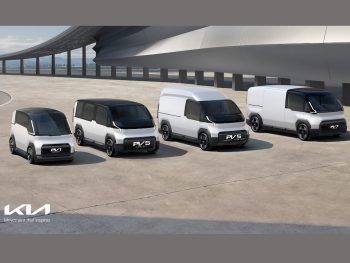CES 2024: Kia previews electric vans with PBV concepts
Kia has showcased its upcoming electric vans with the unveiling of three ‘PBV’ concepts and its overarching strategy at CES 2024 in Las Vegas.

PBVs provide modular vehicles and solutions that “will enhance versatility and open up limitless possibilities, catering to both businesses and individuals”
The South Korean carmaker first announced its plans for PBVs in its 2020 Plan S strategy, designed to support the shift to a sustainable mobility solutions provider.
Originally defined as ‘Purpose-Built Vehicles’ – and now described as ‘Platform Beyond Vehicle’ – PBVs provide customised vehicles and solutions that “will enhance versatility and open up limitless possibilities, catering to both businesses and individuals”, including as car-sharing vehicles and shuttles, and delivery vans and trucks.
Kia says its PBVs are “a total mobility solution that combine fit-for-purpose EVs with advanced software solutions based on the Hyundai Motor Group’s software-to-everything, or SDx, strategy”. They’re not vehicles anymore; they are “devices that offer tailored solutions according to customer usage patterns”.
Returning to CES 2024 after a five-year break from the electronics show, Kia has revealed that its PBV business will initially be based around the introduction of an all-new modular vehicle, previewed by the Concept PV5, which will enter mass production in 2025. It’s designed for operations such as ride-hailing, delivery and utilities and will provide conversion capabilities for diverse customer needs. Versions available will include Basic, Van, High Roof and Chassis Cab variants. In the future, Kia also plans to introduce a Robotaxi model developed with Motional – a joint venture between HMG and Aptiv – which aims to provide a revolutionary autonomous hailing experience for passengers.
The PV5 will also offer enhanced data connectivity between vehicles and external data such as route or delivery information, enabling operation of multiple vehicles as a “software-defined fleet” that cuts downtime and enhances cost-effectiveness.
That’s the first stage in the brand’s multi-phase plan. In phase two, Kia will complete the dedicated PBV model line-up, introducing the ‘PV7’ – the largest product in the line-up – and the ‘PV1’ at the bottom of the range, with other models expected to sit inbetween.
Phase two will also see PBVs “evolve into AI-based mobility platforms that use data to interact with users and ensure that the vehicles are always up to date”. Meanwhile, new forms of business linked with robotics and other future technologies will evolve.
In the third and final phase, Kia says its PBVs will evolve into highly customisable, bespoke mobility solutions by integrating with the future mobility ecosystem, enabling connected self-driving vehicles that can be managed as part of a single smart city operating system.
Rather than the “existing restrictive and one-dimensional industry product line-up offerings”, Kia’s PBVs will feature a modular approach using ‘Easy Swap’ technology to address the diverse demands of customers. Behind the fixed cab, now known as a ‘driver zone’, a variety of interchangeable upper bodies, or ‘life modules’, can be connected to the base vehicle via a hybrid electromagnetic and mechanical coupling technology, turning the PBV from a taxi during the day, to a delivery van at night, and a personal recreational vehicle on weekends.
The brand will also launch a dedicated business system, covering every aspect of the process, from the product line-up to integration of software solutions, and global partnerships. Software solutions include in-vehicle infotainment, fleet management systems and charging; all drawing on software-based data and AI technologies.
“Kia PBVs will initiate a new era of seamless everyday business and lifestyle solutions. We hope to make our customers’ lives easier and better, whether they’re stationary or on the move, offering exceptional flexibility and customisation through radical modularisation,” said Karim Habib, executive vice president and head of Kia Global Design.
“Untethered to any fixed place, and unbounded by the traditional restrictions of space, Kia PBVs offer users a blank canvas to reimagine their lifestyles and workstyles,” he added.
Kia has revealed five PBV concept vehicles at CES 2024, including three variations of the Concept PV5, as well as the Concept PV7 and Concept PV1.
In a separate section, it’s also showcasing its rapidly expanding EV line-up, including the recently revealed EV3 and EV4 concept cars alongside the flagship EV9 and EV6 GT. Kia’s second exhibition also features an EV9 driving technology simulation, a 10 ‘must-have’ sustainable items exhibition, and vehicle-to-home (V2H) power supply and vehicle-to-load (V2L) camping demonstrations in real-life scenarios.

